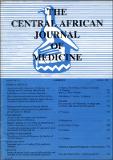| dc.contributor.author | Khedun, S.M. | |
| dc.contributor.author | Naicker, T. | |
| dc.contributor.author | Maharaj, B. | |
| dc.date.accessioned | 2015-06-05T08:28:17Z | |
| dc.date.available | 2015-06-05T08:28:17Z | |
| dc.date.issued | 1995-10 | |
| dc.identifier.citation | KHEDUN, S.M., NAICKER, T. & MAHARAJ, B. (1995) Zinc, hydrochlorothiazide and sexual dysfunction. CAJM vol. 41, no.10. ( pp. 312- 315) , UZ, Avondale, Harare: CAJM. | en |
| dc.identifier.issn | 0008-9176 | |
| dc.identifier.uri | https://opendocs.ids.ac.uk/opendocs/handle/20.500.12413/6278 | |
| dc.description | A CAJM article on sexual dysfunction. | en |
| dc.description.abstract | This study was designed to test the hypothesis that hydrochlorothiazide a diuretic used to treat hypertension depletes body zinc and thereby cause sexual dysfunction. Serum zinc and sexual dysfunction were measured in 39 middle aged hypertensive men who had been taking hydrochlorothiazide in average daily doses of between 25 and 50 mg daily for at least six months, and a control group of 27 unmedicated middle aged normotensive men. The medicated group had a higher incidence of sexual dysfunction (56 pc) as compared to 11 pc in the control group. The use of hydrochlorothiazide did affect serum zinc levels significantlyin 20 patients. Sexual dysfunction occurred more often in older and overweight patients (p < 0,004). Three of the normotensive men experienced sexual dysfunction probably related to old age. | en |
| dc.language.iso | en | en |
| dc.publisher | Central African Journal of Medicine (CAJM), University of Zimbabwe (UZ). | en |
| dc.rights.uri | http://creativecommons.org/licenses/by-nc-nd/3.0/ | en |
| dc.subject | Health | en |
| dc.subject | Sexuality and Development | en |
| dc.title | Zinc, Hydrochlorothiazide and Sexual Dysfunction. | en |
| dc.type | Article | en |
| dc.rights.holder | University of Zimbabwe (UZ). | en |


